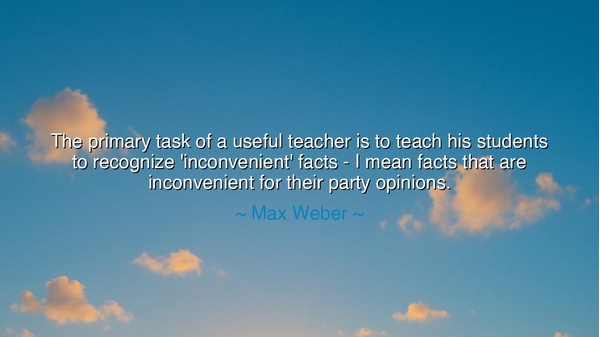
The primary task of a useful teacher is to teach his students to
The primary task of a useful teacher is to teach his students to recognize 'inconvenient' facts - I mean facts that are inconvenient for their party opinions.






Max Weber, the great thinker of society and truth, once declared: “The primary task of a useful teacher is to teach his students to recognize inconvenient facts — I mean facts that are inconvenient for their party opinions.” These words strike with the weight of iron, reminding us that true wisdom is not in repeating what pleases, but in facing what disturbs. The teacher who only comforts his students imprisons them; the teacher who dares to reveal the inconvenient awakens them to reality. For truth is not always sweet to the tongue, but it is always the seed of freedom.
Weber’s teaching reveals the sacred duty of the teacher: not to mold disciples into echoes of their faction, nor to flatter the ears of the powerful, but to pierce through illusions with the sword of fact. For the greatest danger to the human spirit is not ignorance, but the refusal to see what is before our eyes. We are all tempted to build walls around our beliefs, shielding them from contradiction. Yet the noble teacher breaks those walls, forcing the student to stand before truth unguarded. Only then is wisdom born.
History gives us a vivid example. In the 1960s, during the height of the American civil rights struggle, many clung to party lines that denied injustice. Yet teachers — both in classrooms and in pulpits, both black and white — revealed inconvenient facts: that segregation was cruelty, that the law was unjust, that the Constitution itself was betrayed. These truths were not comfortable; they shook the foundations of established order. But they were necessary. It was through such teaching, through such unveiling, that generations were stirred to action, and society began its long, painful march toward justice.
The ancients too honored such voices. Socrates, condemned by his city, was guilty of no crime but that of teaching youth to question the accepted and to recognize inconvenient facts about their leaders and themselves. His death is a solemn testimony: the world often despises those who reveal truth, but it cannot silence them forever. A single teacher with courage may plant a seed that outlives empires.
But let us not romanticize this calling. To teach the inconvenient is to risk scorn, exile, and even death. Students may resist, societies may persecute, and authorities may strike. Yet Weber’s words remind us: this is the “primary task.” For if a teacher fails here, all other lessons are shallow. What good is arithmetic if it is used to count the profits of tyranny? What good is rhetoric if it is used only to shield lies? Knowledge without the courage to face inconvenient facts is but an ornament of the mind, not a tool of the soul.
The lesson for us is clear: if you are a student, seek the teacher who unsettles you, who forces you to think, who reveals truths you would rather ignore. Do not cling only to what flatters your belief or strengthens your faction, for that path leads only to blindness. And if you are a teacher, be bold. Do not merely soothe; challenge. Do not merely repeat; reveal. For in this lies the worth of your craft — not in pleasing many, but in awakening a few.
What must we do, then, in our daily lives? First, practice humility before truth. When faced with an inconvenient fact, resist the urge to dismiss it; instead, ask what it demands of you. Second, cultivate courage: for truth may cost comfort, but it always grants freedom. And third, extend gratitude to those teachers — in classrooms, in books, in life itself — who have dared to confront you with what you did not wish to see. For they are the true architects of wisdom, and their gift is priceless.
Therefore, let Weber’s words resound across generations: the useful teacher is not the one who tells us what we wish to hear, but the one who drags us into the light of reality. May we honor such teachers, may we become them for others, and may we never fear the inconvenient fact, for it is the rough stone upon which the blade of truth is sharpened.






AAdministratorAdministrator
Welcome, honored guests. Please leave a comment, we will respond soon